NHS Greater Glasgow and Clyde identifies ten priority areas in which we will take action on to address the global challenges of climate change and biodiversity loss.
To play our part in tackling the climate crisis, NHS Scotland is aiming to become a net-zero health service by 2040 at the latest. We are part of an international coalition of over 50 countries to date who have committed to developing low-carbon health systems. We will take action in each of the priority areas below to achieve NHS Scotland’s 2040 target of net zero carbon and biodiversity net gain.
Active Travel and Transport
Active Travel
The emissions from transport and travel are significant in a large organisation such as NHSGCC, particularly due to the vastness of our operational activities and services.
NHSGGC are continuously encouraging sustainable travel by making staff and visitors aware of the various public transport links that are available to them.
There are a variety of public transport and active travel routes to our hospital sites and health centres (Shuttle Bus for staff).
Bus information screens have been installed at QEUH, GRI, Stobhilll, New Victoria and Gartnavel to improve access to bus services at these locations. Transport advice in real time for NHSGGC patients, visitors and staff – NHSGGC
The Travel Plan Office continue to promote sustainable and active travel and host events to provide information on public transport and active travel options, including Cycle to Work.
Transport
Due to the size of the geographical area covered by NHSGGC, some element of travel and transport will always be required. These are often providing a vital service, however there are a number of ways the associated emissions can be reduced.
NHSGGC are committed to adding to our electric/hydrogen fleet, adding additional electric vehicle charging points and minimising the impacts from our fleet operations.
Glasgow’s Low Emission Zone was enforced from 1 June 2023. Now all vehicles must meet emission standards when entering city centre zone.
So far NHSGGC has…
- Added over 100 electric vehicles to our fleet.
- Established three transport hubs to reduce courier mileage by incorporating external deliveries into our existing fleet runs.
- Trained over 200 drivers on Fuel Good Driving – reducing fuel consumption and engine idling.
- Achieved a 4 Star Eco Fleet rating.
- Installed over 200 EV charging points across the board and developing projects to install more.
What we’re doing…
- Managing and developing NHSGGC Cycle to Work scheme.
- Reviewing, developing and implementing projects to improve cycling infrastructure e.g. secure bike storage, across our estates.
- Creating walking and cycling maps for our main acute sites, indicating links to National Cycle Routes and walking routes; Queen Elizabeth University Hospital and Royal Hospital for Children Walking and Cycling Guide.
- Promoting annual season tickets for public transport operators to provide cost savings for staff. Using Public Transport – NHSGGC.
- NHSGGC continue to work in partnership with a range of stakeholders including Local Authorities, SPT and Transport Providers to review and develop active and sustainable travel.
Electric Vehicle Charging
From 22nd April 2024, NHSGGC implemented a fee for the use of its Electric Vehicle (EV) charging points of 45p/KWh.
NHSGGC have until this point incurred the cost of providing the use of EV charging equipment on its sites, however the cost of providing and maintaining such a service means that the implementation of a usage charge is a necessity to the board. The charges implemented by NHSGGC complies with its EV Charging Policy and are in line with other public sector bodies across Scotland.
To ensure the use of EV charging points on our sites is fair and equitable a maximum time limit of 4 hours is being applied to each session at which point drivers are required to move their vehicles. Failure to do so would incur an additional charge of £40.
Access to EV charging is through an app operated by EV charging provider Fuuse, which can be used to pay for EV charging sessions.
For more information about the Fuuse app, click here.
For more information about the new arrangements for for EV charging, click here.
Greenspace and Biodiversity
We are committed to enhancing biodiversity and green spaces across the NHS Greater Glasgow and Clyde estate.
Well-managed green and open spaces around our healthcare buildings play an important part in the physical and mental health of patients, staff and visitors. Access to greenspace has been shown to have both a preventative and restorative effect on health and wellbeing and a view of a natural setting can even help to reduce the time a patient spends in hospital. These spaces also support and contribute to enhanced local biodiversity, climate change adaptation and mitigation, active travel, and a reduction in the effects of air pollution, excessive noise, heat, and flooding.
NHSGGC has a significant environmental footprint due to the nature and size of the organisation. A recent study carried out in partnership with Public Health Scotland (PHS) found that 62% of NHSGGC’s estate is made up of greenspace, making it one of our most important resources. As well as providing direct benefit to patients, visitors and the workforce, this greenspace resource can also be of value to local communities. In our role as an anchor institution, NHSGGC is committed to improving access to and use of our green spaces by local people and organisations. In particular, providing the benefits of attractive, natural spaces to some of the more deprived areas and communities around our sites helps to alleviate health and wellbeing inequalities and contributes to improved quality of life for all.
What we’re doing…
- Maximising internal and external funding opportunities to develop projects that make use of our outdoor estate for the health and wellbeing of patients, staff, visitors, and the local community.
- Working with partners across the public, private and third sectors to protect and enhance natural capital within the NHSGGC estate and to recognise it as an important resource in meeting local and global sustainability goals.
- Mapping the NHSGGC outdoor estate to establish the extent and value of this resource and to help focus and prioritise project development.
- Developing sustainable management strategies for each of our acute sites to make the most of our existing assets by 2025.
- Assessing the potential of our outdoor estate to assist in adapting to the effects of climate change. This will include fitting green infrastructure to address flooding and installing passive cooling systems to combat increasing temperatures both retrospectively within our existing estate and as an integral part of all new projects by 2030.
- Ensuring that all future building and development complies with the NHS Sustainable Design and Construction Guide.
Sites
NHSGGC Greenspace and Biodiversity Projects
Royal Alexandra Hospital – Pond and Beyond
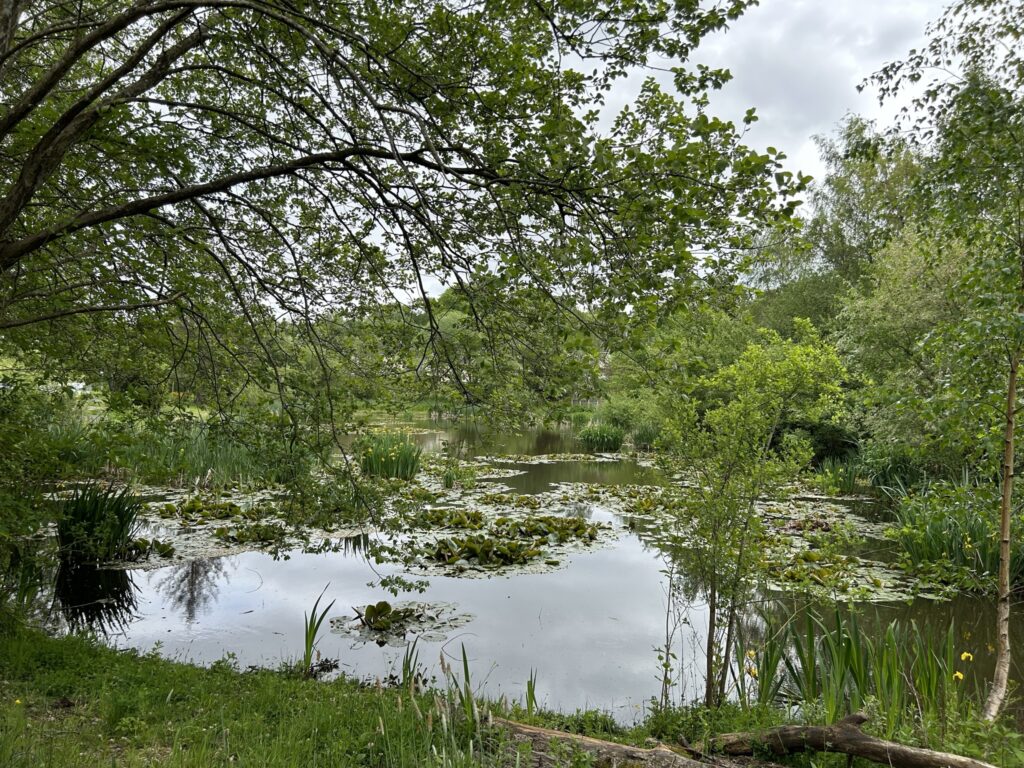
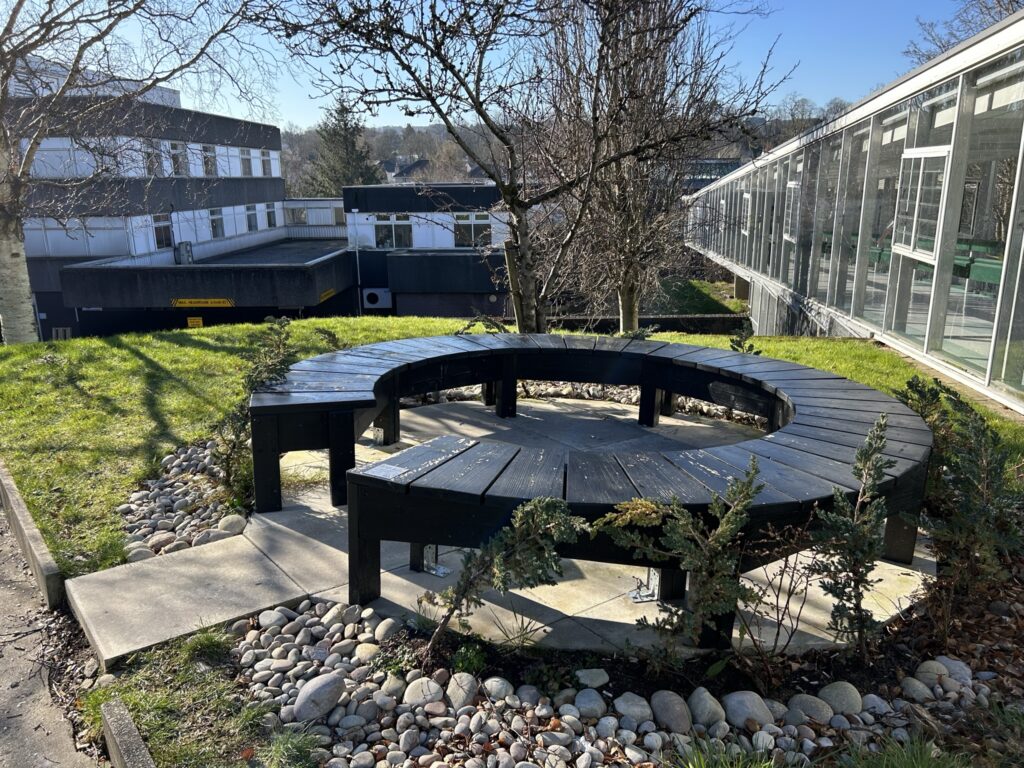
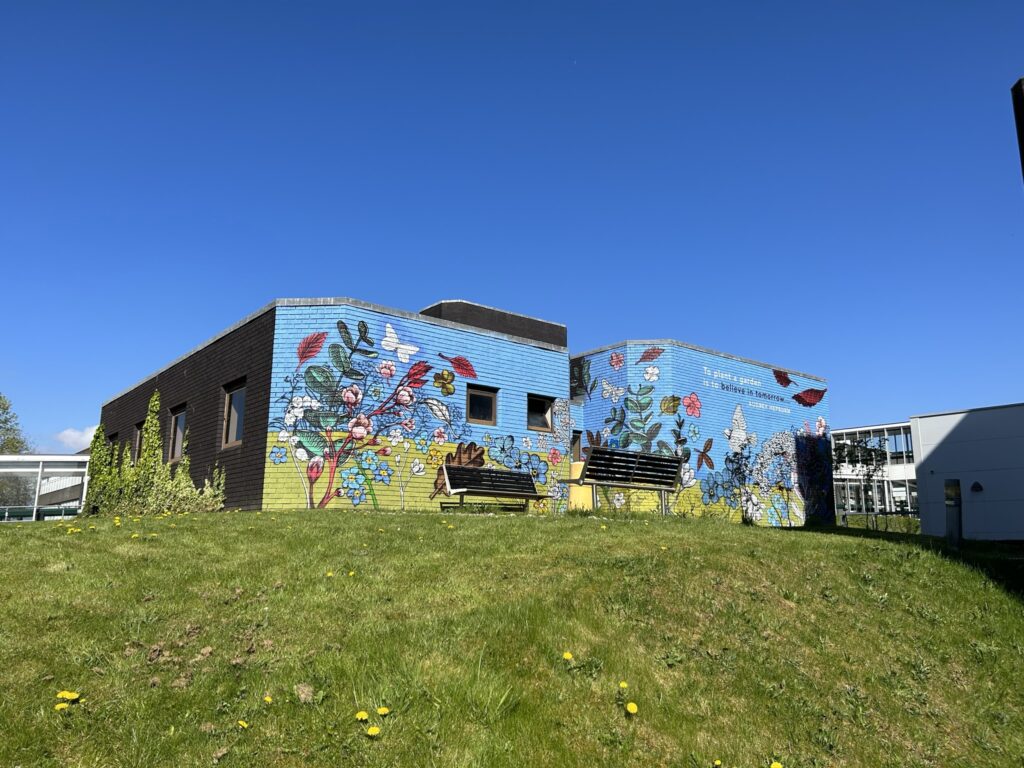
Gartnavel
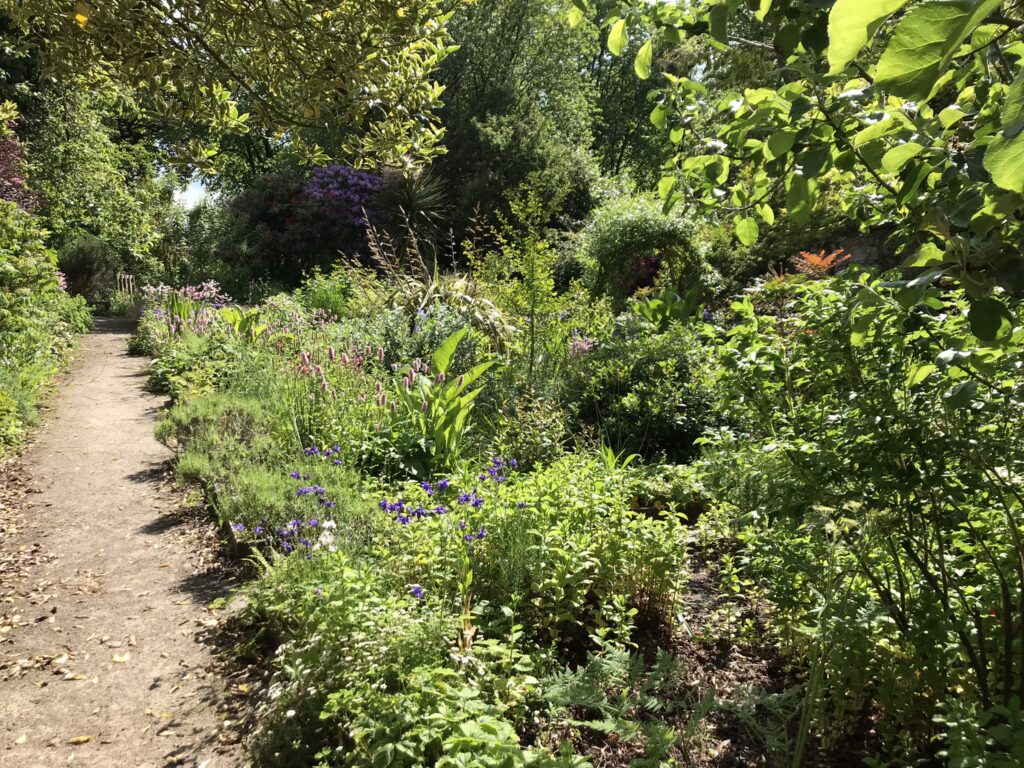
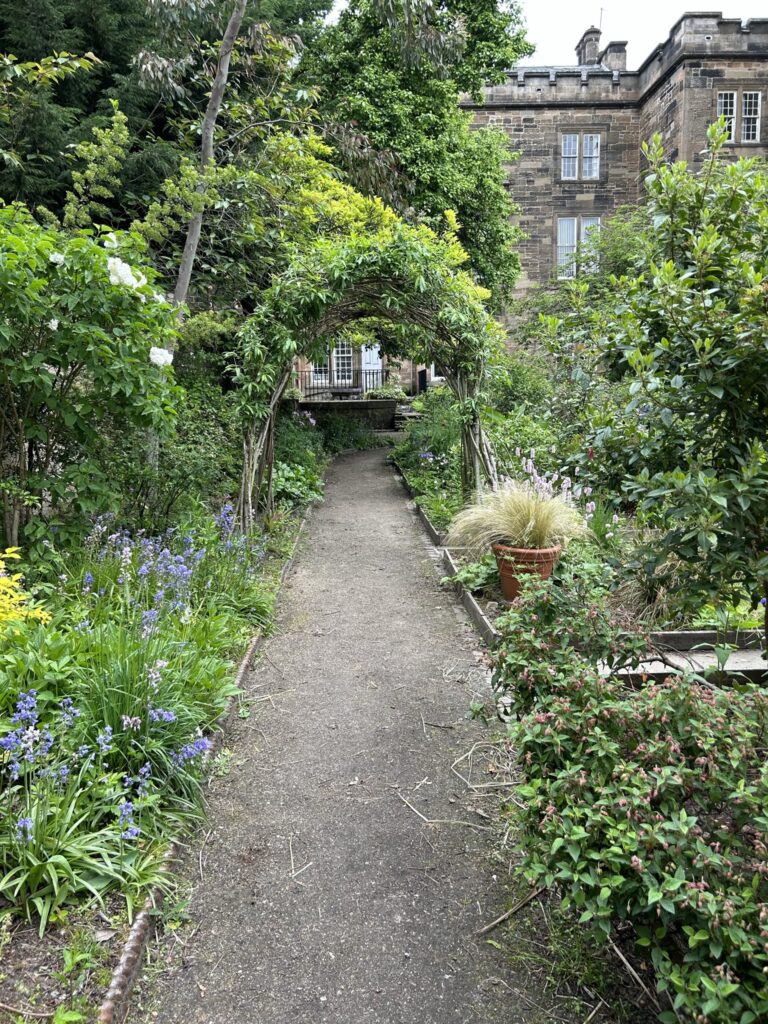
Leverndale
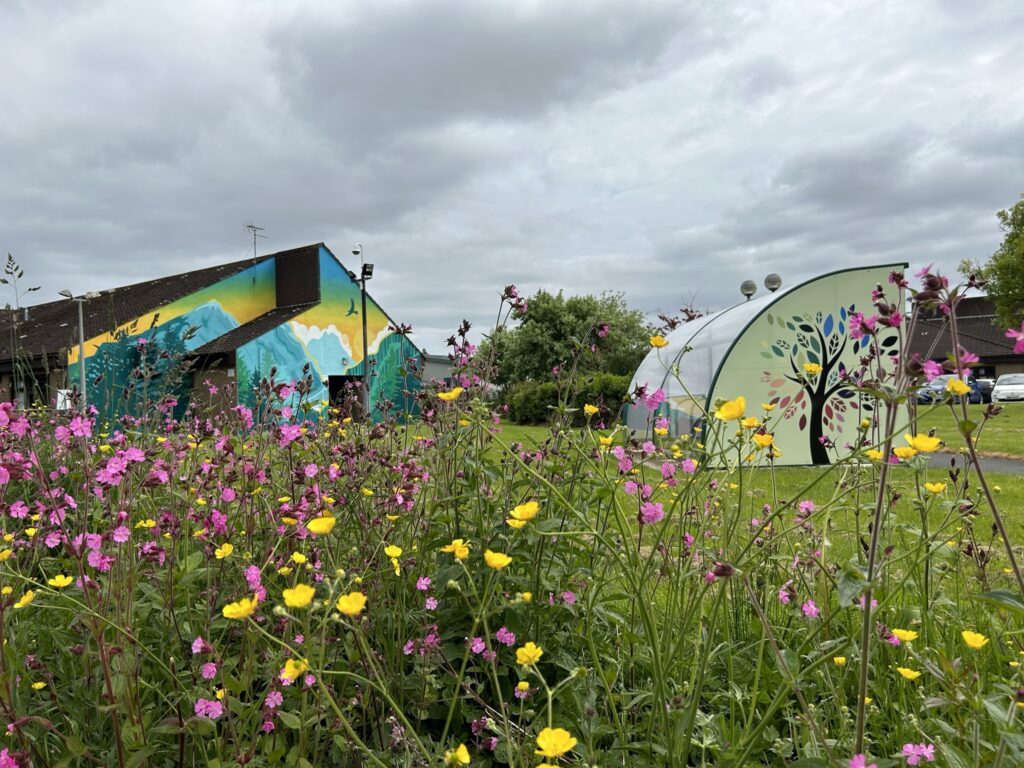
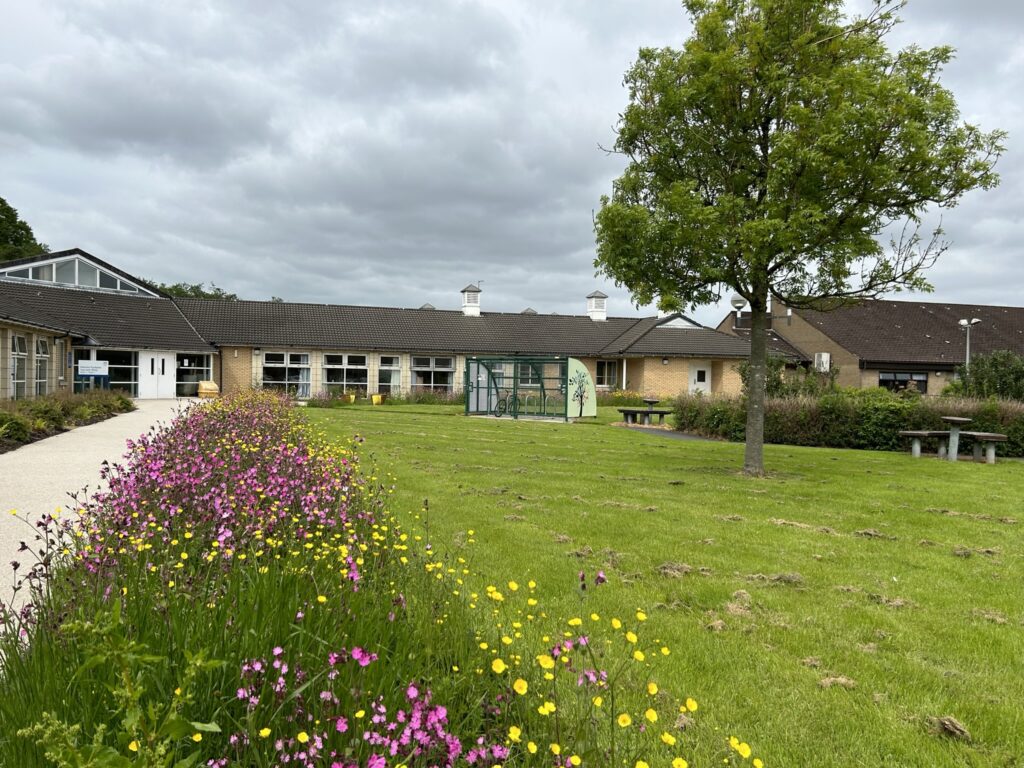
Queen Elizabeth University Hospital
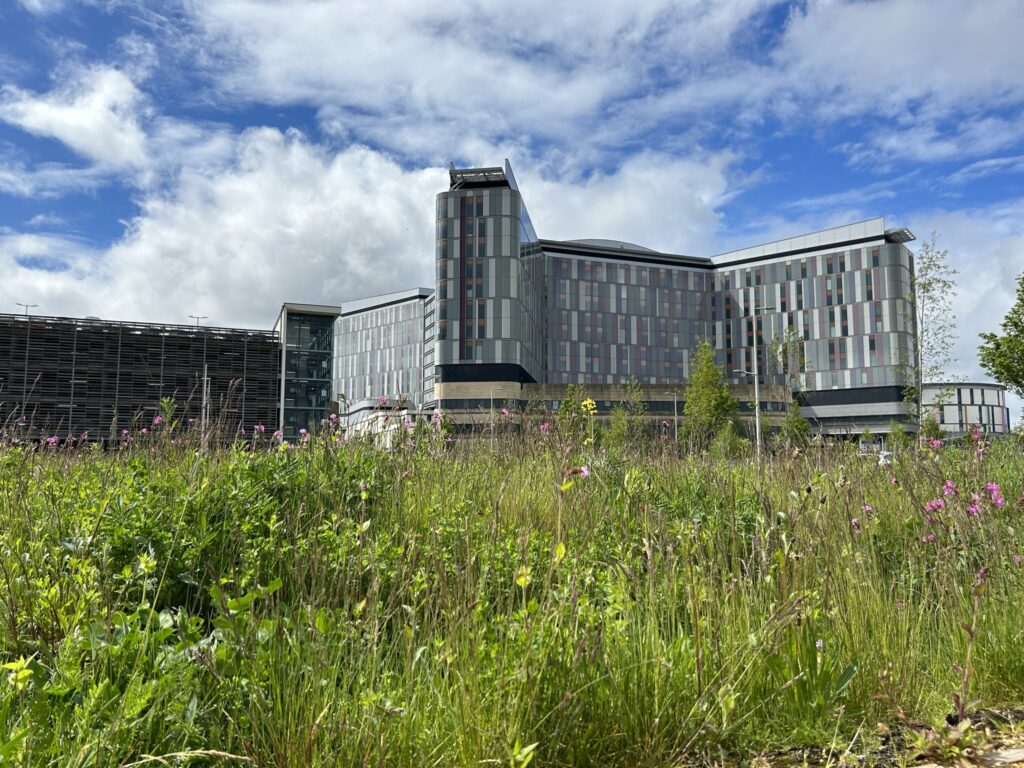
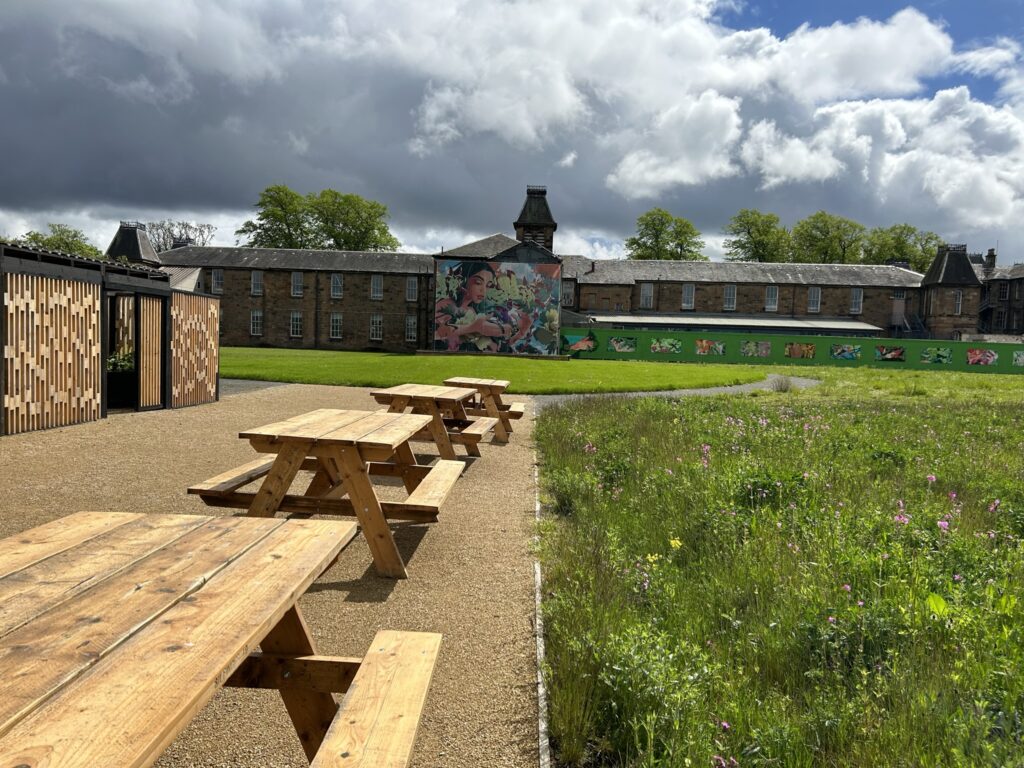
Capital Planning
The emissions associated with the construction and operation of our buildings are significant and we have a responsibility to ensure these are reduced as far as reasonably possible.
NHSGGC is one of the largest public sector landowners in Scotland. The estate varies enormously from Victorian stone buildings to mid-century concrete framed and clad hospital towers. The challenge to achieve a net zero position from this baseline should not be underestimated. However we are committed to ensuring that our property and assets are optimised to be efficient and to be a benefit to the communities and patients they serve.
The design and construction of new buildings can easily align with modern low carbon techniques and practice. A greater challenge comes from the existing buildings, which represent a high amount of spent embodied carbon, so careful consideration must be made here.
What we’re doing
- Site-specific net zero masterplans to be commissioned for each acute site, incorporating plans for green infrastructure, renewable heating systems, enhanced access for public transport and walking/cycling, maximising the use of existing facilities and identifying optimal siting where new-build is required.
- Work to develop site strategies to optimise existing estate and improve functionality, accessibility and amenity.
- Explore options for new buildings and major refurbishments to be carbon neutral in construction, and reduce as far as possible the emissions associated with their operation.
- Explore the use of renewable heating systems and utilise this technology where appropriate.
- Ensure whole-life considerations, including embodied carbon and eventual demolition/disposal are taken into account when selecting materials and building elements.
Environmental Management
NHS Greater Glasgow and Clyde is committed to continual improvement in minimising the environmental impact of its operations.
We recognise the detrimental impacts our services can have on the natural environment. As a healthcare provider, we seek to minimise these impacts whilst delivering health co-benefits for staff, patients and our local community.
Our Environmental Management System assists the organisation in demonstrating that NHSGGC address and minimise environmental impacts alongside managing legal compliance. It also assists us in monitoring and continuously improving our environmental performance.
The EMS is based broadly on the requirements of ISO 14001:2015 and is appropriate for the diverse nature of the NHS estate, the large number of sites and broad range of activities and environmental aspects relating to NHSGGC.
For more information, including the scope of the Environmental Management System, please contact: Sustainability.Team@ggc.scot.nhs.uk.
Energy
NHSGGC is committed to achieving best practice benchmark standards in energy efficiency for healthcare establishments while meeting UK and EU legislations in relation to energy and the environment.
As part of our environmental strategy, NHSGGC is committed to responsible energy management and will practice energy efficiency throughout all our premises, plant and equipment, wherever it is cost effective to do so.
Within our commitment to serving the local community in providing effective and efficient healthcare services, NHSGGC will provide and maintain an appropriate comfortable internal environment, in line with NHS guidelines, that minimises energy consumption and provides a synergy with our environmental and Sustainability targets for the NHS. This also aligns with the UN Sustainable Development Goals.
By avoiding wasting energy we will also avoid unnecessary expenditure, help to prolong the useful life of fossil fuels and protect the wider environment by the amount of greenhouse and other potentially harmful gases released into the atmosphere.
What we’re doing…
- All EPC’s are in process of being updated to reflect new dynamic certificates, starting off with Glasgow Royal Infirmary (GRI).
- 3 major Carbon Reduction Projects (QEUH WWHP, Stobhill & Leverndale ASHP) proposals are in place to take to Outline Business Case (OBC).
- Reviewing various energy and renewable frameworks to widen range of technologies.
- An ongoing annual spend to save programme of energy efficiency and carbon reduction projects NHSGGC eHealth Dept have agreed both a Digital Strategy and a Cloud Strategy which will result in Cloud Technologies being used, where possible, and any new Infrastructure which will be sited in Computer Rooms will have an element of Power Consumption reduction included within tenders.
For more information please contact: GGC.EnergyTeam@ggc.scot.nhs.uk.
Sustainable Procurement
NHSGCC are committed to making net zero a key consideration for all procurement activities and no longer purchase from suppliers that do not meet or exceed a commitment to be net zero.
Sustainable Procurement requires NHS Scotland to work alongside suppliers to take into consideration the whole lifecycle, environmental, social and ethical impact of procured goods & services. The NHS purchases products from suppliers all over the world and an environmentally and socially responsible approach implements an opportunity to boost health and wellbeing throughout the UK and globally. Embedding sustainability at the heart of procurement decisions can reduce negative impacts on the local community and those around us, whilst bringing the organisation closer to our net zero goals.
What we’re doing…
- Invested in a Carbon Footprint Tool – allows NHSGGC to identify where we are being wasteful with carbon and taking action to reduce the waste and emissions.
- Increase and improve the measuring and monitoring of associate carbon emissions from all goods and service providers.
- Increase the scope and weight given to contracts and product selection that support and directly reduce associated carbon emissions.
- To only purchase products or services from suppliers that are aligned with net-zero commitments.
- Review and select only procurement frameworks that have committed to a net-zero target.
- Change of pack size to National Uniforms to deliver a 50% plastic packaging reduction and cost cuts of waste disposal.
- Commit to reducing our reliance on single-use equipment, investing in take-back schemes and reuse schemes where possible.
Sustainable Procurement Steering Group (SPSG) December Newsletter
Waste
NHSGGC is committed to taking an innovative approach to driving out waste, delivering year-on-year reductions in cost and volumes.
NHSGGC delivers healthcare services across a wide portfolio of settings, resulting in the production of a correspondingly broad range of wastes.
NHSGGC is responsible for managing the waste produced by its employees irrespective of whether the waste generated on a site owned or leased by the board. NHSGGC is obliged to comply with all regulatory requirements, including, but not limited to those related to The Health and Safety at Work etc Act (1974) and the Environmental Protection Act (1990).
NHS Greater Glasgow and Clyde is responsible for adhering to the waste hierarchy as far as is reasonably practicable, enacting a waste minimisation strategy and implementing circular economy principles.
In the workplace, a large variety of wastes are produced; these can be classified broadly into the following six ‘core’ waste streams:
- Healthcare (including clinical) waste – waste produced as a direct result of healthcare activities which may pose a risk of infection and/or is medicinally contaminated.
- Other (non-healthcare) special wastes – waste with hazardous characteristics produced from support (non-healthcare) activities, such as paints, batteries, and waste electrical and electronic equipment (WEEE).
- Source-segregated recyclates – glass, paper, card, plastics, metals, and other metals suitable for recycling.
- Construction waste – Minor Estates and capital projects works.
- Food waste – unwanted food from patients, staff, and visitors of the site.
- Residual waste – the fraction of waste that remains once all special waste, recyclates and food have been removed at source. This is typically described as ‘black bag’, ‘domestic’ or municipal waste.
For more information or any waste management queries, please contact ggc.wasteteam@ggc.scot.nhs.uk
Watch Your Waste Campaign
Awareness
Awareness of the importance of the climate emergency and sustainability has never been greater but it can still be challenging to know how we can make a difference.
By engaging our staff to create a culture of sustainability, we can empower each and every one of our people to be part of the solution. It is envisaged that through work place behaviour change, our staff can take ownership at home too, adopting more sustainable lifestyles, assisting Glasgow and Scotland in achieving its climate change goals.
Awareness Days
A calendar of events, featuring newsletters, information, facts and figures – this calendar will provide opportunities to communicate success and instigate change
Communications and Engagement
People underpin sustainable healthcare – we need the help of staff, partners and people in the community to ensure this agenda delivers positive and beneficial outcomes for all.
We can only achieve high levels of engagement within sustainability if the relevant information is communicated effectively and clearly.
Ambitions
We believe NHSGGC can be a leading role model within the public sector and a champion for sustainable development – encouraging and developing change and engagement in our stakeholders
By engaging with and harnessing the enthusiasm of the 1.2 million people we serve, and our 38,000 staff members we can deliver real and lasting change
NHS Greater Glasgow and Clyde aims to be a:
Sustainability Role Model
Showing leadership and minimising our impacts
Sustainability Educator
Inform our staff, patients, communities and stakeholders of sustainability
Sustainability Champion
Support policy measures and work with others to embed sustainability to the heart of NHSGGC
Communications Team
Through close collaboration with the organisation’s Communications Team, we aim to promote newsletters, surveys, and relevant information on a regular basis.
Comms Team: Assist Sustainability Team in distributing materials both internally and externally
Sustainability Team: Prepare engaging materials to be sent to Communications Team for distribution
Sustainability Governance Group: High-level governance, strategic direction and leadership
What we’re doing
- Following NHSGGC’s Sustainable Communications Plan.
- Identify works stream leads/champions in line with priority areas that will improve our sustainability and net zero performance.
- Support staff to lead change at individual, team and departmental level aligned to the Board’s corporate sustainability objectives.
- Empower staff to take advantage of sustainability initiatives which boost health and wellbeing;
- Improve our service provisions, offering more sustainable alternatives where possible and reducing risk to service operations.
- We will deliver engaging internal communications to create interest in the strategy amongst our colleagues as part of wider cultural change across the business, sharing good news stories and highlighting best practice.
Education
We must take our 40,000 staff on this journey with us, ensuring staff are equipped with the knowledge and skills to ensure they can make changes in both their professional and personal lives.
- Creation of a Sustainability e-learning package in 2023 with additional bespoke modules relevant to specific subject areas; you can now access our e-learning modules via LearnPro by searching course name GGC: 301 Sustainability.
- Creation of downloadable learning packages including posters, information and other learning resources.
- Identify works stream leads/champions in line with priority areas that will improve our sustainability and net zero performance.
- Support staff to lead change at individual, team and departmental level aligned to the Board’s corporate sustainability objectives.
- Empower staff to take advantage of sustainability initiatives which boost health and wellbeing.
- Improve our service provisions, offering more sustainable alternatives where possible and reducing risk to service operations.
Community Wealth Building
NHSGGC as an Anchor Organisation
As an anchor organisation, NHSGGC drives community wealth building by taking deliberate actions to support local people into secure employment, to procure goods and services locally where possible, and ensure NHS assets are best used to the advantage of the local community. This in turn supports Scotland’s ambition to deliver wellbeing economy which protects the planet and works for the people by improving living standards, creating good jobs, purposeful businesses, and building economic resilience.
What we’re doing – Case Studies
With our Land and Assets
1. Transfer of Former Under-utilised Car Park to Housing Provider
The overflow car park for the former Victoria Infirmary was declared surplus and checked by the Scottish Government’s directorates, as per the NHS Property Transactions Handbook. The More Homes Division declared interest in the site and confirmed that the site would support a housing development. A housing provider was identified and the proposed scheme was for a “later living” and adapted housing development. As a result of the transfer of this site, it will be redeveloped to provide housing and also will enhance the local surrounding area by developing a previously underutilised site. Prospecthill Road | Collective Architecture
2. Greenspace Project: Pond and Beyond Project at Royal Alexandra Hospital (RAH)
A greenspace project to rediscover the pond at the RAH and improve access to and around the pond for patients, visitors, and staff. The project will deliver an enhanced greenspace within a busy hospital site and encourage not just the users of the hospital but also the local community to use the site. Works to enhance and restore a pond and its under-utilised surroundings at the Royal Alexandra Hospital are complete, and the site is now well used by patients and staff. This environmental improvement project includes an exhibition space, which was developed simultaneously and is situated in dining room, available for programming by the Renfrewshire cultural programmes. Stunning new greenspace takes shape at RAH pond – NHSGGC
3. Arts and Health Strategy
We have an Arts and Health Strategy within all our capital developments. One example was Greenock Health and Social Care Centre’s Building Better Health Care Best Collaborative Arts Project 2022, highlighting and celebrating local area through collaboration with local arts sector and residents. Building Better Healthcare November 2022
With Spending and Procurement
1. Local spend
The procurement strategy commits us to increase the proportion of trade spend with those suppliers that are based in the six local authority areas within the NHSGGC geographical area. The 23/24 spend data indicates that NHSGGC had an annual spend total of £106,868,030 with local suppliers (defined as suppliers within the same local authority), which is 12.6% of overall trade spend.
2. Community Benefits
It is a mandatory inclusion of participation through the NHSGGC contracting process to agree to the concept of Community Benefits. Through the NHSGGC Contract and Supplier Management process, Community Benefits is a point contained within the standard Key Supplier Meeting agenda. This captures and monitors key suppliers’ Community Benefits activity, which can be delivered through a national Community Benefits Gateway portal (Access our Community Benefit Gateway | National Services Scotland) or via employability activities such as creation of apprenticeships and targeted recruitment to enable local people to gain employment.
3. Diversifying the Supply Chain
NHSGGC’s Procurement and Public Health departments have worked in partnership with the Supplier Development Programme to deliver a project aiming to diversify our supply chain, after a successful funding bid to the Health Foundation’s Health Anchor Learning Network. The project aimed to encourage a wide pool of suppliers, support more local SMEs to become suppliers, and focused in particular on increasing diversity. Diversifying NHS Greater Glasgow and Clyde Supply Chain — Health Anchors Learning Network
As an Employer
1. Black and Minority Ethnic Leadership Programme
NHSGGC recognises that an inclusive and diverse workforce that reflects the diversity of the population it serves is better able to meet that population’s needs. Following successful Year 1 and 2 Programmes, we continue to complement our existing portfolio of management and leadership development provision with a Year 3 Leadership Skills Programme for Black and Minority Ethnic Employees in NHSGGC. The programme aims to support employees to fulfil their potential, and access opportunities that will not only be beneficial for those individuals’ career progression, but will also have a positive impact on healthcare provision. It enables participants to recognise and further develop their skills and abilities as leaders.
2. Hardship Fund
In challenging economic times, we recognise the impact that money worries can have on staff wellbeing and have introduced a Hardship Fund available for short term support to our staff. This is in addition to wider services available to staff and patient population through our Support and Information Services (SIS) team.
3. Promotion of Mentoring in Partnership with MCR Pathways
MCR Pathways directly recruits, trains and supports high quality adult mentors who meet weekly in school with a young person during term time, for a minimum of a year. Building relationships, confidence and self-esteem are the prerequisite to helping young people find, grow and use their talents. Subsequent supported pathways and MCR talent tasters then support effective transitions to higher education, further education and employment. NHSGGC has a partnership agreement with MCR Pathways to promote mentoring by its staff and, by August 2023, 57 NHS employees had registered to be a mentor.
Clinical Sustainability
NHSGGC recognises that healthcare and the way we provide care can have a major impact on our communities and the environment.
By changing how we plan and deliver services we can empower people to have more control over their health and deliver rapid and long-lasting change which is environmentally sustainable, increases our contribution to good health and reduces health inequalities.
Our clinicians and staff are at the heart of NHS Scotland and NHS Greater Glasgow and Clyde’s climate emergency response and our efforts to become an environmentally and socially sustainable health service.
What we’re doing…
NHSGGC has in place robust governance processes for overseeing the implementation of the National Green Theatres Project (NGTP) and wider clinical sustainability opportunities. The Clinical Sustainability Group oversees all clinical sustainability work streams and reports into all Governance Forums, with senior clinical and managerial leadership representing board wide clinical specialities.
- NHSGGC has removed the use of desflurane, a potent global warming anaesthetic gas, from its theatres since early 2024.
- To date, NHSGGC has decommissioned 4 nitrous oxide manifolds across its theatres. It is anticipated that the remaining 5 manifolds across the estate will be decommissioned by December 2024. It is anticipated that this will save 140 tonnes of carbon making its way into the environment.
- Turning off Heating Ventilation and Air Conditioning (HVAC) Systems in theatres during out of hour’s periods. NHSGGC is working towards its ambitions to reach Net-Zero targets through various operating methods, one of them being turning off HVAC systems across 8 theatres at the Queen Elizabeth University Hospital. Plans are in place to implement this significant carbon and cost saving strategy across all pertinent NHSGGC theatres throughout 2024/25.
- 2022 saw lowest levels of Orange Waste since 2012. This has been achieved through improved segregation practices and circular economy techniques, however there is still room for improvement. Education and learning events are now held across hospital sites to increase awareness of the financial and carbon savings available by effectively segregating clinical waste has on the organisation and our environment.
- In 2023, NHSGGC – Primary Care Directorate undertook a Quality Improvement Project –Respiratory Inhalers, across 20 GP practices in the North East of Glasgow. The scope of the project was for GPs to review patients using 6 or more short acting inhalers per year. This cohort of patients were assessed and those deemed suitable were transferred to a more carbon friendly dry powdered inhaler. The results from the pilot show carbon savings through a more environmentally friendly device, a reduction in the use of short acting inhalers in the pilot practices and effective management of long term respiratory disease such as COPD and asthma.
